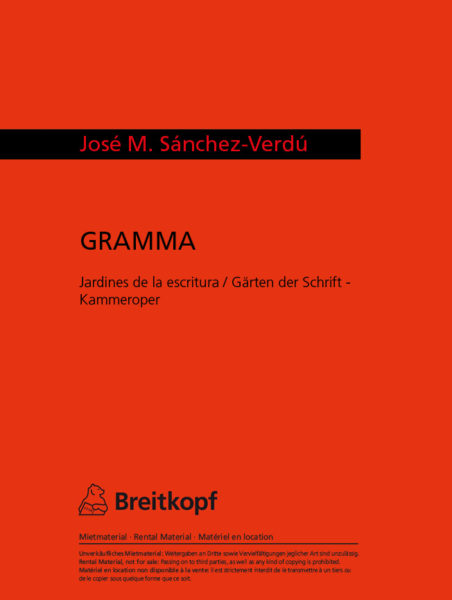José M. Sánchez-Verdú (*1968) GRAMMA
Jardines de la escritura / Gärten der Schrift – Kammeroper [Soli,GCh,Orch] 2004-2006 Dauer: 60'
Soli: 2STBar – Spr – Chor: CT/MezTBarB – Fl(Picc.B-Fl).Klar(B-Klar.Kb-Klar).Sax.Fag(Kfg). – Trp.Pos. – Schl(2) – Akk. – 4Vl.2Va.2Vc.Kb
Uraufführung: München (Münchener Biennale), 18. Mai 2006
Kompositionsauftrag der Landeshauptstadt München für die Münchener Biennale, das Luzerner Theater und El Palau de les Arts Reina Sofía, Valencia
Soli: Thamos (Schauspieler, Sprecher) / Tot (Bariton) Sirena (Sopran) Ulisses (Tenor) Venus (Sopran) Ensemble: Fl(Picc.BFl).Klar(BKlar.KbKlar).Sax.Fag(KFag) Trp.Pos Schl(2) Akk 4Vl.2Va.2Vc.Kb
Schrift ist Wohltat und Verderben. Sie bewahrt und erklärt, sie zerstört und lügt. Die Kammeroper Gramma reflektiert sowohl musikalisch als auch szenisch über Möglichkeiten und Gefahren des Aufschreiben-Könnens, über die Eitelkeit des geschriebenen Worts und dessen Macht zur Manipulation, aber auch über den Kampf der Schrift gegen das Vergessen und deren Fähigkeit, neue Welten entstehen zu lassen. Mit Bezug auf Texte von Platon, Homer, Augustinus, Ovid, Hugo de San Victor, Stéphane Mallarmé und Paul Celan, aber auch aus der Bibel, dem Koran und der Thora kreiert die Kammeroper einen engen Zusammenhang zwischen schriftlichen und musikalischen Darstellungsformen.
„Das Theater war aufgebrochen, nicht eine Bühne lenkte den Blick, sondern das vor einem liegende Buch. Es war ein Fokus, der bewies, in welchen Dimensionen Bild, Aktion und Musik zu denken sind.“
(Neue Musik Zeitung)
Bibliografie:
Steimel, Olivia: Zum Einsatz des Akkordeons als Orchesterinstrument im modernen Musiktheater, gezeigt an den folgenden Werken: Adriana Hölszky: Die Wände (1993-94), Hans Zender: Chief Joseph (2003), José M. Sánchez-Verdú: GRAMMA Gärten der Schrift (2004-06), Diplomarbeit an der Hochschule für Musik Würzburg 2012.
Sánchez-Verdú, José M.: Schrift und Aura im Musiktheater, in: Neue Musik in Bewegung. Musik- und Tanztheater heute, hrsg. von Jörn Peter Hiekel (= Veröffentlichungen des Instituts für Neue Musik und Musikerziehung Darmstadt, Band 51), Mainz u.a.: Schott 2011, S. 79-101.









